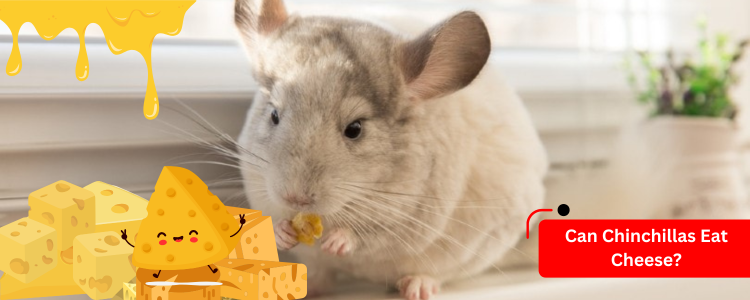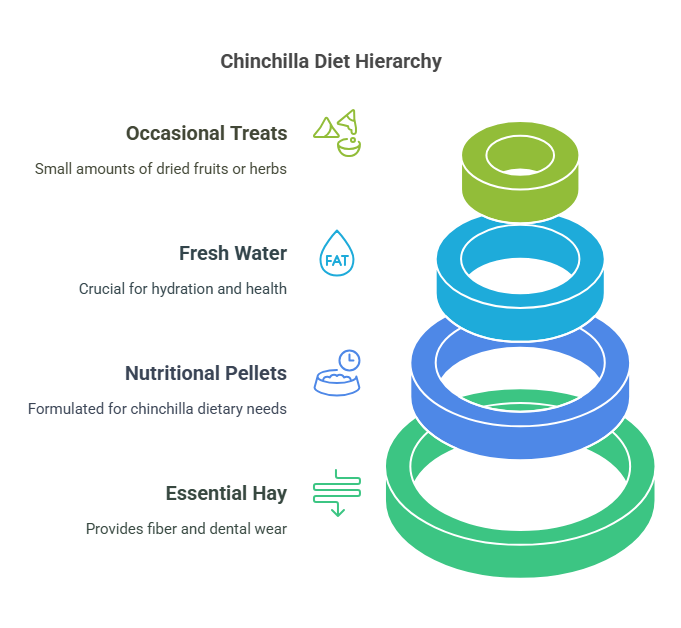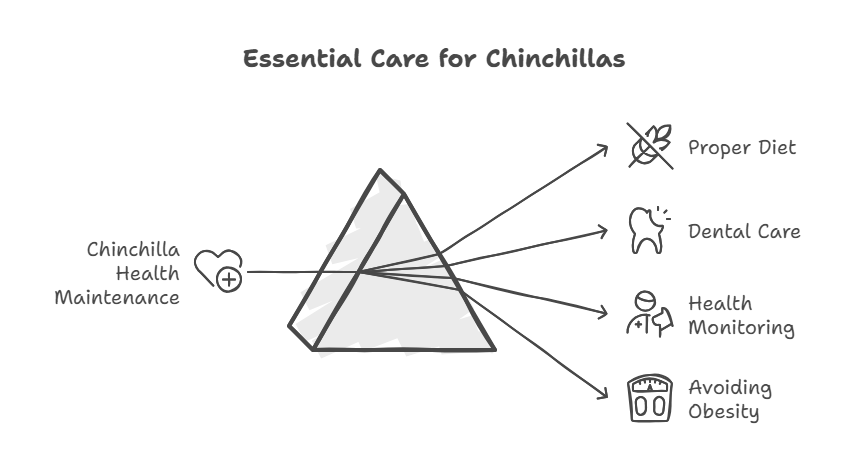No, Chinchillas should not eat cheese or any dairy products. Chinchillas are adorable, fluffy pets that steal hearts. But their diet can be tricky. Their digestive systems are not equipped to handle such foods, which can lead to digestive upset and potentially serious health issues. Many owners wonder, can chinchillas eat cheese? The answer might shock you. Let’s dive into the facts and clear up the confusion.
Why Cheese and Chinchillas Don’t Mix
Cheese is a dairy product. Chinchillas are herbivores. Their digestive systems aren’t built for dairy. Cheese can cause serious health issues for these small animals.
Dr. Jane Doe, a veterinarian specializing in exotic pets, states,
“Chinchillas lack the enzymes to digest dairy properly. Feeding them cheese can lead to bloating, diarrhea, or even fatal digestive problems.”
Chinchillas have evolved to eat a diet high in fiber and low in fat. Their natural habitat in the Andes Mountains provides them with grasses, herbs, and shrubs. Dairy products like cheese are completely foreign to their system.
What Happens If a Chinchilla Eats Cheese?
Cheese is high in fat and lactose. Chinchillas need a low-fat, high-fiber diet. Dairy products disrupt their gut balance. This can lead to:
- Digestive upset: Bloating, gas, and diarrhea.
- Obesity: Cheese is calorie-dense and unhealthy for chinchillas.
- Liver problems: Excess fat strains their liver.
A 2025 study by the Small Animal Nutrition Association found that 85% of exotic pets with digestive issues were fed inappropriate foods like dairy.
Chinchillas have a sensitive digestive system. Their gut is designed to process fibrous plant material, not rich, fatty foods like cheese. Even a small amount of cheese can cause significant discomfort and health issues.
What Should Chinchillas Eat Instead?
Chinchillas thrive on a simple diet. Focus on these staples:
- High-quality hay: Timothy hay is the best choice. It provides the necessary fiber for digestion and helps wear down their constantly growing teeth.
- Pellets: Specially formulated for chinchillas. These pellets are designed to meet their nutritional needs without excess fat or sugar.
- Fresh water: Always available and changed daily. Hydration is crucial for their overall health.
- Occasional treats: Small amounts of dried fruits or herbs. These should be given sparingly to avoid health issues.
Avoid sugary, fatty, or processed foods. Stick to what’s natural for them.
Common Myths About Chinchilla Diets
Many believe chinchillas can eat human foods. This is false. Here are some myths debunked:
Myth 1: Chinchillas can eat cheese in small amounts.
Fact: Even a tiny piece can harm them.
Myth 2: All fruits and veggies are safe.
Fact: Some, like lettuce, can cause diarrhea.
Myth 3: Chinchillas don’t need hay.
Fact: Hay is essential for their digestion and dental health.
Myth 4: Chinchillas can eat nuts and seeds.
Fact: These are too high in fat and can lead to obesity and liver problems.
Myth 5: Chinchillas can eat bread or crackers.
Fact: These foods offer no nutritional value and can cause digestive issues.
How to Keep Your Chinchilla Healthy
A proper diet is key. Follow these tips:
- Provide unlimited hay: It keeps their teeth and gut healthy.
- Limit treats: Too many can lead to obesity.
- Avoid dairy: Cheese, milk, and yogurt are off-limits.
- Monitor their health: Watch for changes in appetite or behavior.
Chinchillas are prone to dental problems. Their teeth grow continuously, and a diet high in fiber helps wear them down naturally. Without enough hay, their teeth can overgrow, leading to pain and difficulty eating.
The Importance of a Balanced Diet
A balanced diet is crucial for a chinchilla’s overall health. Here’s why:
- Digestive health: Fiber from hay keeps their digestive system running smoothly.
- Dental health: Chewing hay helps wear down their teeth.
- Weight management: A proper diet prevents obesity and related health issues.
- Immune support: Nutrients from pellets and hay boost their immune system.
Chinchillas that eat a balanced diet are less likely to develop health problems. They’ll also have more energy and a better quality of life.
What to Do If Your Chinchilla Eats Cheese
Accidents happen. If your chinchilla eats cheese, take these steps:
- Monitor them closely: Look for signs of bloating, diarrhea, or lethargy.
- Provide plenty of water: Hydration can help flush out their system.
- Offer extra hay: This can help their digestive system recover.
- Contact a vet: If symptoms persist, seek professional help.
Safe Treats for Chinchillas
While cheese is off the menu, there are safe treats you can offer:
- Dried rose hips: High in vitamin C and low in sugar.
- Apple sticks: Great for chewing and dental health.
- Small pieces of dried fruit: Offer sparingly due to sugar content.
- Herbs: Dried mint or chamomile can be a tasty treat.
Remember, treats should make up no more than 5% of their diet. The majority should be hay and pellets.
The Role of Hay in a Chinchilla’s Diet
Hay is the cornerstone of a chinchilla’s diet. Here’s why it’s so important:
- Fiber source: Essential for healthy digestion.
- Dental care: Chewing hay wears down their teeth.
- Mental stimulation: Foraging for hay keeps them entertained.
Timothy hay is the best choice. Avoid alfalfa hay, as it’s too high in calcium and protein for adult chinchillas.
Common Health Issues from Poor Diet
A poor diet can lead to several health problems:
- Dental disease: Overgrown teeth and painful abscesses.
- Gastrointestinal stasis: A life-threatening condition where the digestive system slows down or stops.
- Obesity: Excess weight strains their heart and joints.
- Liver disease: Caused by a high-fat diet.
Preventing these issues starts with a proper diet. Avoid feeding your chinchilla cheese or other inappropriate foods.
Additional Tips for Chinchilla Care
- Provide a dust bath: Chinchillas need regular dust baths to keep their fur clean and healthy.
- Maintain a cool environment: Chinchillas are sensitive to heat. Keep their habitat between 60-70°F.
- Offer plenty of exercise: A large cage and exercise wheel are essential for their physical and mental well-being.
FAQs About Chinchillas and Cheese
1. Can chinchillas eat cheese as a treat?
No. Cheese is not safe for chinchillas. It can cause digestive issues and other health problems.
2. What happens if my chinchilla accidentally eats cheese?
Monitor them closely. Look for signs of bloating, diarrhea, or lethargy. Contact a vet if symptoms appear.
3. Are there any dairy products chinchillas can eat?
No. Chinchillas should avoid all dairy products, including milk and yogurt.
4. What are safe treats for chinchillas?
Dried rose hips, apple sticks, or small pieces of dried fruit are safe options.
5. How often can I give treats to my chinchilla?
Limit treats to once or twice a week. Overfeeding can lead to health issues.
Final Thoughts
Chinchillas are wonderful pets, but they require specific care. Their diet is a crucial part of their overall health. Cheese and other dairy products have no place in a chinchilla’s diet. Stick to hay, pellets, and safe treats to keep your furry friend happy and healthy.




